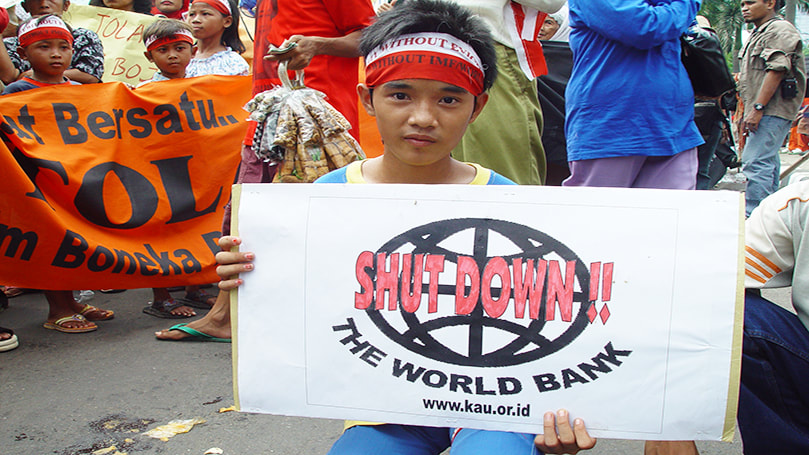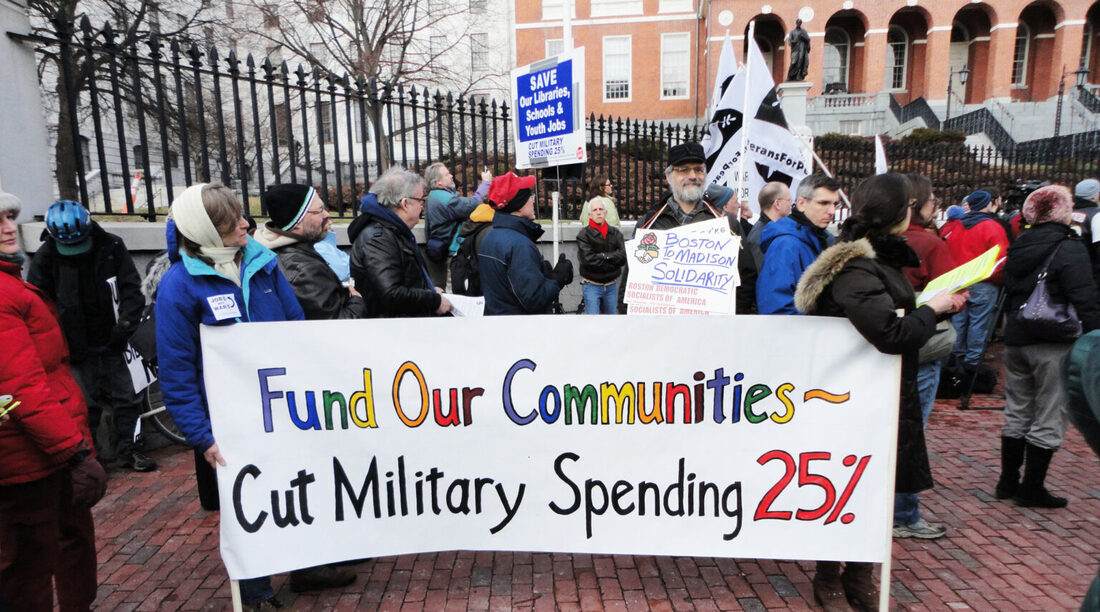|
10/17/2022 Anti-imperialism is central to the struggle against capitalism By: Emile SchepersRead NowImages: World Bank protest, Jonathan McIntosh, photo cropped and lightened (CC BY 2.0); U.S. Army soldiers, Ryan DeBooy, U.S. DOD, photo cropped (public domain); Protest of military budget, Peace Action, photo cropped and lightened (Facebook). A feature which distinguishes our communist parties from other tendencies which define themselves as “socialist” is our emphasis on anti-imperialist solidarity. A starting point for anyone who wants to understand imperialism is V.I. Lenin’s 1916 book Imperialism: The Highest Stage of Capitalism. In this important work, Lenin outlines the essential features of 20th-century imperialism as follows: “Free trade” is replaced by huge monopolies operating on a global scale. In the 21st century, all of this still applies with some modifications (for example the wars generated by imperialism are more between the imperialist center and the resistance in the poorer countries). After the triumph of the October Revolution and the rise of the USSR and the Comintern, anti-colonial freedom movements in the colonies and “semi colonies” (i.e., the nominally independent poorer countries) increasingly saw communism as a source not only of ideas and inspiration but also of material support for their struggles against the colonial powers and the wealthy imperialist countries. This tendency increased after the Second World War and the coming to power of communist-led, socialist governments in the German Democratic Republic, Poland, Czechoslovakia, Hungary, Romania, Yugoslavia, Bulgaria, and Albania. There were new socialist revolutions first in China, then in the Democratic People’s Republic of Korea, Vietnam, Laos, and Cuba, as well as strong communist-influenced or allied people’s movements in many other countries. In response, the leaders of the main imperialist countries made every effort to undermine the existing socialist states, and to block any socialist advances in other countries. As the most powerful of the imperialist states, the United States led the way in many of these efforts. The methods used by imperialism to block socialist movements and maintain economic and political control over the newly independent and poorer countries have included, and continue to include, pouring “foreign aid” money into these countries in such a manner as to reinforce right-wing oppositional currents. We all know about the activities of the CIA, but U.S. agencies such as USAID, the National Endowment for Democracy, and others also perform this function on a large scale. The techniques of imperialist hegemonic control also include sanctions designed to cripple recalcitrant countries, coups d’état and assassinations, and even direct military intervention. Imperialism has also enlisted the services of cultural institutions, literary figures, religious movements, the media (and right now especially the social media), and right-wing labor union leaders in this endeavor to protect its hegemonic interests. Since the collapse of socialism in the USSR and Eastern and Central Europe, the remaining socialist countries and the pro-socialist people’s movements in the global South have faced very great difficulties, since they lost access to fair trade arrangements and material and ideological support. The neoliberal package of “free” (i.e., monopoly dominated) trade, elimination of labor and environmental protection regulations, privatization of public resources of every kind, and the imposition of austerity measures are the prices poorer countries are forced to pay to survive in the 21st-century economic, political, and military environment. The enforcement mechanisms of the neoliberal world order include trade sanctions such as those the United States continues to impose on socialist Cuba, “free trade” agreements such as CAFTA-DR, and “structural adjustment” programs such as those imposed by the International Monetary Fund and the World Bank (both entities controlled by imperialism). The poor countries find themselves trapped in unpayable debt, with dire consequences should they default. And they have to keep themselves in the good graces of the bond rating agencies (Standard and Poor’s, Moody’s, Fitch) if they are ever to be able to get development financing on the international bond market. Private hedge funds, such as Elliot Capital Management, buy up the sovereign debt of poor countries at discounted prices and then try to force those countries to pay them the full original amount. Elliot even got a judge in Ghana to seize a ship of the Argentine Navy in an effort to force Argentina to cooperate with such an arrangement. The late president of Cuba, Fidel Castro, tried to get the heavily indebted poorer countries to form a united front which would refuse to pay the unpayable debts. Unfortunately, he was not listened to. In too many of the poorer countries, the ruling groups are heavily, and often corruptly, enmeshed in the imperialist project. Of the greatest importance is the predominance of the U.S. dollar in international trade. None of the poor countries can use their own national currencies for purchasing vitally needed supplies on the international market. This is because currencies like the Cuban peso are not considered “hard currencies,” and so trade must be carried out with U.S. dollars or very few others. By restricting Cuban access to dollars, U.S. imperialism has made it extremely difficult for Cuba to get such crucial things as fuel, spare parts to maintain its infrastructure, and even medical supplies and equipment. Various efforts are underway to challenge the trade hegemony of the dollar, including a possible new BRICS currency. With the dynamic rise of the economy of the People’s Republic of China, it is possible that the yuan will become an alternative hard currency. These are the ways in which 21st-century imperialism harms the peoples of the poorer countries around the world. But how does imperialism, of which the United States is by far the biggest state player, affect working-class people in the United States itself? Firstly, by keeping the poorer countries poor in a world dominated by transnational monopolies and international trade, imperialism motivates U.S. employers to move their operations overseas in search of the cheapest labor costs possible, exercising a downward pressure on wages here in our own country. Secondly, the massive super profits created by imperialism benefit the wealthiest people in the United States, increasing inequality at home. And since wealth and power are fungible in capitalist society, this dynamic also undermines our limited democracy. Thirdly, imperialism requires vast public expenditures on the military, using up resources that could and should go to meeting vital human needs here. Finally, this stage of capitalism is creating multiple crises which harm workers and other ordinary folk, both at home and abroad. Suffice it to mention the climate crisis, which is very much a product of the capitalist-imperialist mode of production. What is to be done? The last words of the Communist Manifesto are “Workers of all nations, unite!” You cannot fight against capitalism unless you also fight against 21st-century imperialism, and the struggle against imperialism is the same as the struggle against capitalism. We need a far larger and more effective anti-imperialist movement in this country, encompassing all fields of political activity. And new opportunities for building this movement are opening up, especially among young people. The youth-led surge of new labor militancy is just one manifestation of this. For many years it was very hard to get much of organized labor involved in international solidarity activities, due to the lingering influence of McCarthyism. With millions of young workers actively organizing their workplaces, we see that change is coming, and this will also strengthen the anti-imperialist movement. The auguries are positive. AuthorEmile Schepers is a veteran civil and immigrant rights activist. Emile Schepers was born in South Africa and has a doctorate in cultural anthropology from Northwestern University. He has worked as a researcher and activist in urban, working-class communities in Chicago since 1966. He is active in the struggle for immigrant rights, in solidarity with the Cuban Revolution and a number of other issues. He now writes from Northern Virginia. This article was republished from CPUSA. Archives October 2022
0 Comments
Leave a Reply. |
Details
Archives
July 2024
Categories
All
|



 RSS Feed
RSS Feed